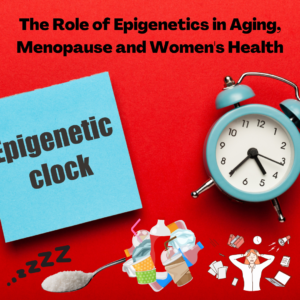
THE ROLE OF EPIGENETICS IN AGING, MENOPAUSE AND WOMEN’S HEALTH
Perimenopause is a time where the hormones Estrogen, Progesterone and Testosterone can wreak havoc on a woman’s body and mind. We search for advice from our gynecologists and “Dr. Google” for solutions to rebalance our hormones or improve our health. We seem to skip over the influences of environment and behavior, but that is, in fact, where many of these answers can be found. It is through the study of Epigenetics and Endocrine Disruptors that many causes of diseases and hormonal imbalance are discovered.
What are Endocrine Disrupters? According to the National Institute of Environmental Health Sciences, “Many chemicals, both natural and man-made, may mimic or interfere with the body’s hormones, known as the endocrine system. Called endocrine disruptors, these chemicals are linked with developmental, reproductive, brain, immune, and other problems.” These disruptors can be found in plastics like water bottles and food packaging, clothing, cosmetics and even the air we breath. The NIEHS lists common endocrine disruptors to include but are not limited to:
- Bisphenol A (BPA) found in many plastics,
- Perfluoroalkyl and Polyfluoroalkyl Substances (PFAS) found in nonstick pan, paper and textile coatings,
- Phthalates found in food packaging, cosmetics and children’s toys,
- Triclosan found in personal care products like body wash
In the book Our Hormones, Our Health, Drs. Esche-Belk and Kirschner-Brouns share that in 2012, the World Health Organization categorized endocrine disruptors as a global threat and that current research indicates that 90% of western industrial countries are polluted with these “hormone-active substances”. They also indicate that BPA has estrogen-like effects that can “lead to premature puberty and behavioral issues in children.” Refined sugars are also known to disrupt our hormonal system and increase the aging process. That’s right; sugar can make you age faster.
What can we do to avoid ingesting these substances and protect our environments? The book lists some wonderful suggestions such as 1) avoid plastic wherever possible, 2) know what is in your products: phtalate-free, BPA-free, paraben-free (you can use the app “Scan4Chem” to find which endocrine disruptors may be in a manufactured product), 3)buy unpacked produce, 4) do not heat any food that has been previously wrapped in plastic, 5) avoid synthetic fragrances in products and 6) use water filters to treat drinking water.
What about the study of Epigenetics? The CDC defines Epigenetics as “the study of how your behaviors and environment can cause changes that affect the way your genes work.” 99.9% of humans have the same DNA and it is in that tiny window of DNA difference where scientists can determine the causes of disease. For example, imagine if two people carry a gene for a certain type of cancer, but only one of them gets that cancer. What triggered that gene to be activated in one of the people but not the other? Was it his/her environment, personal behaviors or just bad luck? Epigenetics investigates this “why” and tries to locate answers through looking at our environment and behavior.
In Our Hormones, Our Health, the Drs. use the image of a library full of books to explain this complex concept of Epigenetics. Consider epigenetics a “bookmark” that can be placed on a page (i.e. a gene) in a particular book (i.e. your DNA strand). The bookmark may be placed there so that section of the book is not read; in other words the gene remains off. Conversely, if the bookmark was placed there to highlight that portion of the book (DNA strand), then the particular section will be read (the gene is activated). This process is called mythelation (mythel groups) and may actually be passed on from generation to generation.
While it may sound scary, Epigenetics is reversible and we can actually use its findings to improve our overall hormonal health. For example, the book also lists the “superstars” of Epigenetics as:
- pomegranates
- avocados
- broccoli
- salads
- whole grains
- leafy vegetables
- beans
- liver
- fatty fish
They are also studying the roles of stress and our social relationships on our adrenal glands, gut health and mental wellness.
Endocrine disruptors and Epigenetics are relatively new to the scientific world and much still needs be learned. For women in midlife and beyond, knowledge is always power but moderation is key. Try not to read this and think that you need to make dramatic differences to your lifestyle and environment. Small changes can make a big difference. It is suggested to maintain proper sleep (7-9 hours), lower stress (meditation and breathing exercises), self-care, outdoor exercising and healthy food as ways to maintain your overall health and hormone balance. This supplemental information on Endocrine Disruptors and Epigenetics increases our chances for a long healthy life.